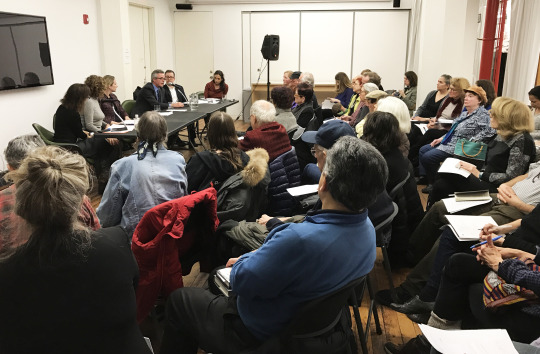Event Recap: Your Art Will Outlive You – How to Protect it Now!
Key takeaways, terms, and artist resources from our January 11 legal panel
The New York Foundation for the Arts (NYFA) and New York State Bar Association Entertainment, Arts, and Sports Law Section’s Fine Arts and Pro Bono Committees recently joined forces to present a panel on how to preserve and extend your creative legacy after you’re gone. The event, “Your Art Will Outlive You – How to Protect it Now,” was co-moderated by art law professionals Judith Prowda and Carol Steinberg, with esteemed legal panelists Elisabeth Conroy, Declan P. Redfern, and Peter Arcese with Alicia Ehni of NYFA Learning. Please refer to our initial blog post for full bio information on our event participants.
Estate Planning 101
- Start planning now. Think about creating a will so that your loved ones are guided by you in making the decisions about your creative work. Wills can be amended and revoked at any time.
- Protect your loved ones by making specific bequests in their name, or by setting up a testamentary trust, which distributes all or any portion of your estate upon your death.
- Think further ahead. You can set up a foundation to maintain an archive of your life and art; support other artists, initiatives, or institutions; and provide and foster scholarship about your work. Notable examples include the Adolph & Esther Gottlieb Foundation, Roy Lichtenstein Foundation, and Robert Rauschenberg Foundation.
Key Takeaways
- Trust the people that are going to be handling your estate, and select people who understand you and the content and rights of your work.
- Keep good records of your creative output throughout your career: you can start creating a history of your work today. This is of special importance when concerning authentication and helps to preserve the personality of the artist moving forward.
- Make clear, precise instructions for those who will be carrying out your estate plans to discourage potential disputes.
- Ownership of copyright in your artwork (reproduction rights, etc.) is separate from ownership and/or possession of the artwork itself, so it is important to think about who will manage the copyright in the work as well as the work itself.
Helpful Legal Terms
- Testator – one who makes a will
- Will – a legal document in which you, the testator, declare who will manage your estate after you die
- Fiduciary – a personal representative who manages and protects your property or money
- Executor – the person, persons, or institution named in the will to manage your estate; be sure to designate someone with legal or financial acumen
- Witness – the person who observes the execution of a legal document and authenticates it with their signature; they cannot be the executor or attorney and must be someone who is not receiving anything from your will
- Valuation – the process of determining the value or worth of an asset, also used as a synonym for appraisal
- Bequest – a gift of personal property or possessions by will
- Trust – a relationship whereby property is held by one party for the benefit of another
- Foundation – a permanent fund established and maintained by contributions for charitable, educational, religious, research, or other benevolent purposes
- Copyright – a form of intellectual property that protects creative works for a limited time and gives the copyright holder (typically the creator), the exclusive right to reproduce, create adaptations, distribute, perform, and display the work
- Authentication – the act or mode of giving authority or legal authenticity to a statute, record, or other written instrument or a certified copy thereof
Additional Resources
- Courtesy Barbara T. Hoffman, Esq.: A Visual Artist’s Guide to Estate Planning, based on a conference co-sponsored by The Marie Walsh Sharpe Art Foundation and The Judith Rothschild Foundation, and 2008 Supplement Update; see also www.hoffmanlawfirm.org
- Volunteer Lawyers for the Arts (VLA) provides pro-bono arts-related legal representation and education to low-income artists and nonprofit arts and cultural organizations. VLA services include an Artists Over Sixty program that provides legal services and education to senior artists to address age-specific legal and business issues.
Questions: [email protected]
-Amy Aronoff, Communications Officer
Image: Legal Panel: Your Art Will Outlive You – How to Protect it Now, Photo Credit: Amy Aronoff
This program is part of NYFA Learning, which includes professional development for artists and arts administrators. Sign up for NYFA’s free bi-weekly newsletter to receive updates on future programs.





